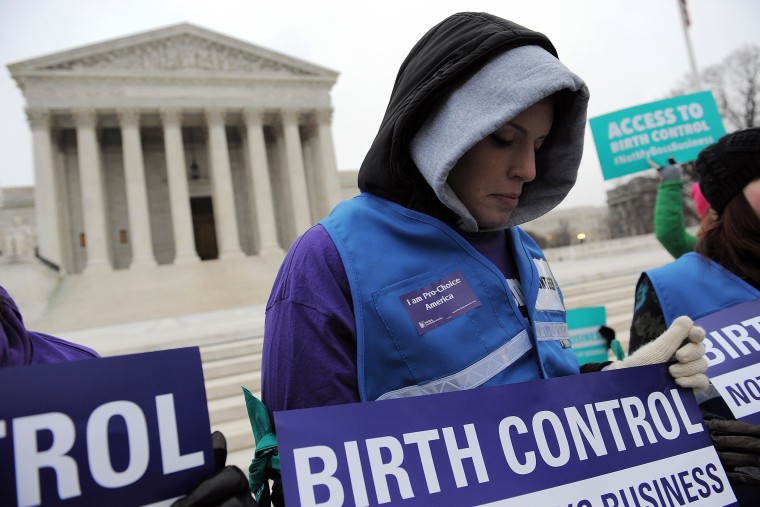A couple of years ago, when conservative opposition to contraception access was starting to become more common, Sen. Ron Johnson (R-Wis.) was asked about the millions of American women who can't afford access to birth control. The Republican replied, "My wife actually went online here in Wisconsin and typed in, 'what if I can't afford birth control?' Came up, bam. If you can't afford it, you can get birth control in this country."
Asked what he meant, Johnson added, "You can get it. Go online, type it in. It's easy to get."
It seemed that in the senator's mind, women can go online and "bam," contraceptives are readily available for little or no cost.
Yesterday on CBS's "Face the Nation," the archbishop of New York, Cardinal Timothy Dolan sounded a similar note. After endorsing the Hobby Lobby case at the Supreme Court, which says employers can deny birth control coverage to employees because corporations are people with their own distinct religious belief, Dolan was asked about the dangers of a private company using religion to deny benefits to its employees.
"It could [set a dangerous precedent]. As you know, they're arguing that, and the Supreme Court, in the past, if I understand correctly, has said in general, the bias is on the side of the rights of conscience and religious liberty. There may be occasions when that is so detrimental to the common good that it will outweigh it. "Is this one of them? I mean is the ability to buy contraceptives that are now widely available? By Lord, all you have to do is walk into a 7-Eleven or any shop on any street in America and have access to them."
Perhaps Cardinal Dolan and I go to very different kinds of convenience stores.
In case there's any lingering confusion, it may be worth clarifying that that there are different kinds of birth-control methods. An American consumer can, for example, buy condoms fairly easily, at a modest price, in plenty of locations. "Any shop or any street in America" is obviously an exaggeration, but access to condoms is, in reality, relatively straightforward.
What's more, emergency contraception -- the "morning-after pill" -- is also now available over the counter.
But that's not what the Hobby Lobby case is about, and given the context, it's not what Dolan was referring to yesterday. Rather, the ongoing political dispute is over access to oral, hormonal birth control, better known as "the pill," which is available by prescription.
If the Supreme Court rules in Hobby Lobby's favor, a corporation's ownership will be able to say, "Our corporation has religious beliefs, and those beliefs find contraception offensive, so therefore our employee health plan will deny contraception coverage." And if that happens, women who work for these companies won't be able to go online to ("bam") find readily available hormonal birth control at an affordable price and they won't be able to stop by their local convenience store to pick the medication off the shelf.
* Update: Ben Dreyfuss asked whether my description of the legal dispute in Hobby Lobby case is mistaken, so I did some additional research -- which is to say, I asked my msnbc colleague Irin Carmon for guidance, since she knows more about the relevant details than I do -- and thought I'd clarify matters.
Ben raises a fair point about the specifics of Hobby Lobby's complaint -- the objections relate to certain forms of birth control, including Plan B emergency contraception and the IUD. But the legal principle at stake in the litigation, and the kind of relief Hobby Lobby hopes to receive from the Supreme Court, has far broader application.
If the justices rule a corporation is a person with its own religious beliefs about birth control, there's no reason to think it would have to be limited to so-called abortifacients. In fact, there are plenty of other cases in the legal pipeline that seek to take advantage of the Hobby Lobby case as part of an objection to all hormonal contraception.
